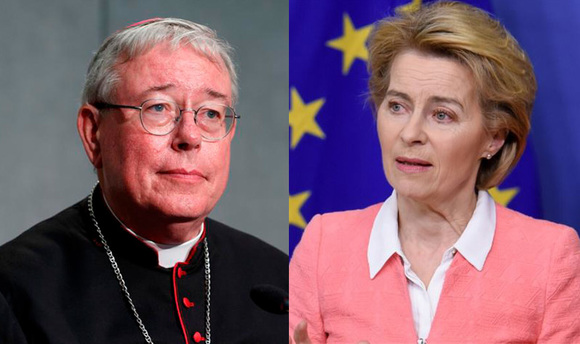In a letter addressed to EC President von der Leyen on Wednesday 2 June 2021, the Bishops of the European Union recall the need of strengthening the EU Special Envoy of Freedom of Religion or Belief with institutional and financial support. Card. Hollerich: “reasonable and adequate resources are needed to promote this fundamental right under threat in many parts of the world.”

EU Bishops President Card. Hollerich and EU Commission President von der Leyen. (Credit: CNS photo/Paul Haring)
On behalf of the Bishops of the European Union, H. Em. Jean-Claude Cardinal Hollerich SJ, President of COMECE, addressed a letter to Ursula von der Leyen, President of the European Commission, following the early-May 2021 statement welcoming the appointment of Christos Stylianides as ‘EU Special Envoy on the Promotion and Protection of Freedom of Religion and Belief outside the EU’.
Cardinal Hollerich emphasises the remarkable work done by the EU mechanism since its creation in May 2016. The previous EU Special Envoy addressed challenging situations in many countries where freedom of thought, conscience and religion is seriously threatened or violented, “despite its limited mandate and resources”.
In the letter, Cardinal Hollerich recalls the need of strengthening the EU mechanism, and requests EC President von der Leyen to support it “with reasonable and adequate human and financial resources that enable the EU Special Envoy to carry on his high responsibility, with a more ambitious and defined mandate and capacity”, as expressed by the January 2021 resolution of the European Parliament.
The President of COMECE expresses Bishops’ satisfaction with the recent appointment of Stylianides, whose previous commitment as Commissioner for Humanitarian Aid opened “fresh space for cooperation with Churches and Faith-Based Organisations in humanitarian activities as well as for interreligious dialogue leading to a better protection of human rights and mutual understanding in conflict situations.”
“His appointment – continues the letter – will give voice to the voiceless individuals and communities whose freedom of thought, conscience, and religion are violated, being subject to intolerance, discrimination and, in some cases, even, persecution.”
